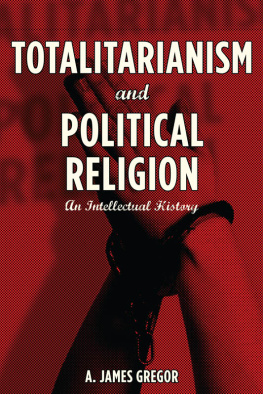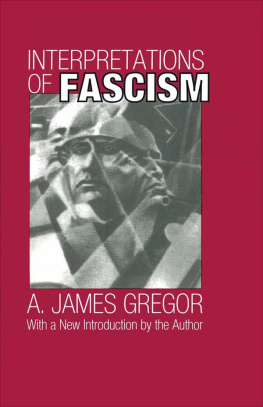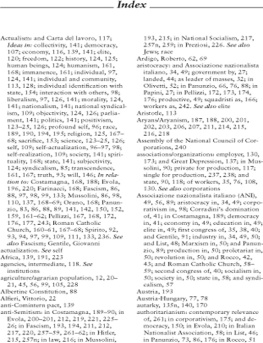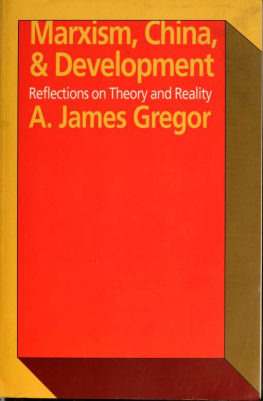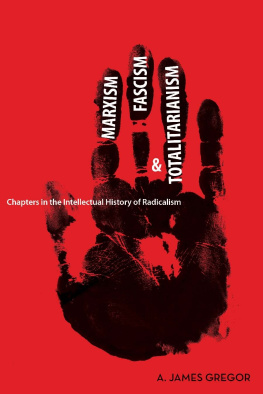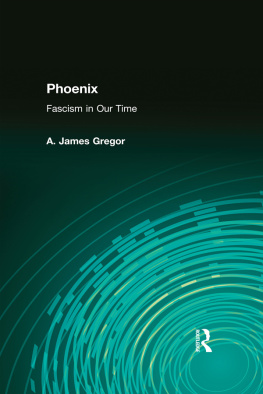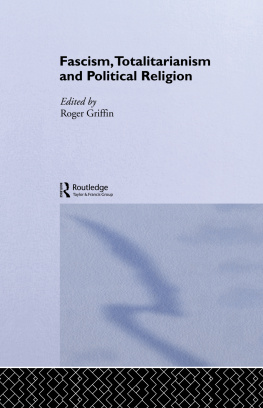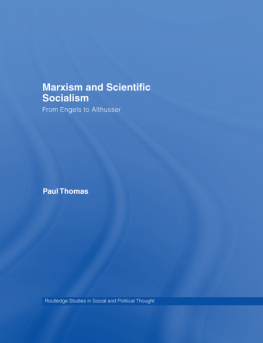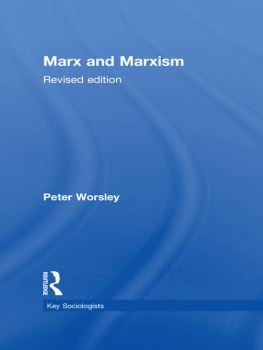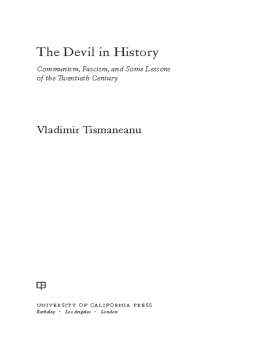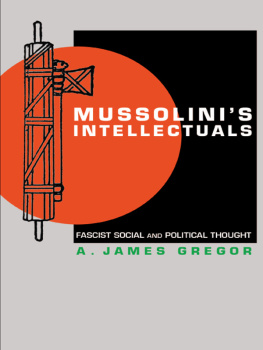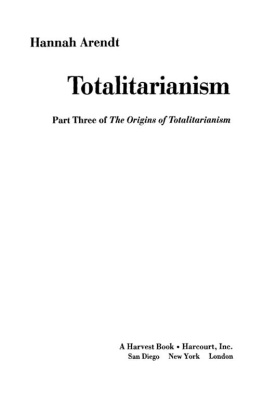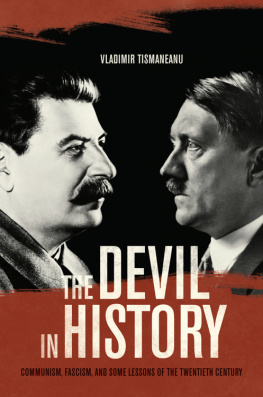Totalitarianism and Political Religion
An Intellectual History
A. JAMES GREGOR
STANFORD UNIVERSITY PRESS
Stanford, California
Stanford University Press
Stanford, California
2012 by the Board of Trustees of the Leland Stanford Junior University. All rights reserved.
No part of this book may be reproduced or transmitted in any form or by any means, electronic or mechanical, including photocopying and recording, or in any information storage or retrieval system without the prior written permission of Stanford University Press
Library of Congress Cataloging-in-Publication Data
Gregor, A. James (Anthony James), author.
Totalitarianism and political religion : an intellectual history / A. James Gregor.
pages cm.
Includes bibliographical references and index.
ISBN 978-0-8047-8130-5 (Cloth : alk. paper)
ISBN 978-0-8047-8368-2 (e-book)
1. TotalitarianismHistory. 2. FascismHistory. 3. National socialism. 4. Religion and politicsHistory. I. Title.
JC480.G745 2012 |
320.53dc23 | 2011036780 |
Printed in the United States of America on acid-free, archival-quality paper
Typeset at Stanford University Press in 10/13 Minion
This book is dedicated to DR. JAMES L. SIMONS, BRIAN CAIN, and MARK ST. LEZIN, whose humanity and skill helped postponethe inevitable long enough to allow its appearance.
Acknowledgments
In the fragmented, self-absorbed, and sometimes alienated academic world of the inexact sciences, we often overlook the reality that we are products of all the efforts of an incalculable number of influences, among them those who taught us, those who argued with us, and those tentative scholars we taught over the years. There is not space enough to individually cite all those who contributed to the work before the reader. It is perhaps enough to call up the generic memory of those good teachers at Columbia UniversityEarnest Nagel, and Arthur Danto among themtogether with all those students who, over half a century, helped me sharpen my cognitive skills. My gratitude must be more specific when I allude to the content of my exposition. Then, I am obliged to refer to that critical tribe of professionals, contenders, and clarifiers from whom I have learned so much and who have influenced my intellectual life to the degree that traces of their work can be found everywhere in my own. Renzo De Felice, Ernst Nolte, and Richard Pipes must be counted among them. And there was Sidney Hook, Anthony James Joes, and Augusto Del Noce, together with Giuseppe Prezzolini, Ludovico Incisa di Camerana, Ugo Spirito, and Herv Cavallera. They all assisted me in my effort to understand the ideas that shaped the world in which I have lived. After half a century of study and application, I have arrived at some tentative conclusions. Those that are plausible are the products of those good persons who instructed me by their works and their counsel. I am solely responsible for those ideas that are flawed.
Finally, I owe a special debt to the professionalism and thoughtfulness of Norris Pope, who shepherded the manuscript through the publication process, from its selection to its final appearance. To my wife, Professor Maria Hsia Chang, I am grateful for all kinds of good things: her advice and patienceand for the presence of all those special creatures that give so much meaning to our lives.
Preface
The twentieth was perhaps the most destructive century in human history. Certainly, more lives and property were consumed through willful human agency during those years than in any other comparable period of time. Human beings killed each other, and destroyed things, with such serious application that the entire century bore a nightmare quality. Millions upon millions perished. Entire cities disappearedand whole continents seemed shaken. At the end, millions of broken human beings returned to shattered homesand only few really could remember what it had been all about. We were told it was all madnessas though that might serve as explanation. In fact, the tragedy deserves more of an accounting than that.
Surely it was a time of madness, but the unnumbered dead of the past century deserve something more than that simple affirmation. The work before the reader attempts to provide something of an interpretive story of that doleful timeits beliefs, its passions, and its temper. Amid all the other factors that contributed to the tragedy, there was a kind of creedal ferocity that made every exchange a matter of existential importance. The twentieth century was host to systems of doctrinal conviction that made unorthodox belief a capital affront, made conflict mortal, and all enterprise sacrificial. Such belief systems were predicated on moral persuasions so intense and inflexible that they could tolerate only an absolute unanimity of opinion within their sphere of influence. Nor was unanimity expected only in opinions held. Entire categories of human beingsconceived somehow alienwere condemned to destruction because of some indelible deficiencymembership in some offending economic class, or as product of a blighted biological provenance. Communities so circumstanced became jealous of their homogeneity, their infrangible unity. In such an environment, thought became ideological, so that any opposition, no matter how temporary or trivial, appeared to threaten the extirpation of a faith, an insult to an entire manner of life.
The century saw the emergence of governments that charged themselves with the responsibility of governing lives in such fashion as to leave little to personal choice. Life was seen as willing service, implicit duty, spontaneous sacrifice, and selfless toiland politics the infallible guide to it all. There were special books, written by special authorsthat were to be venerated. There were Leaders, chosen by God or Historyor both as onewho were Saviors, and Prophets, and All Seeing Sages. There were unitary political parties that were repositories of impeccable truth, sure science, and intuitive verities. There were guardians of it allvanguards, and hierarchies, and central committees, all equipped with answers to all the questions that have puzzled human beings since the beginnings of consciousness. And there were New Men who would people a redeemed creation.
In war and peace these political systems demanded more of their subjects than any other system of government in human memory. In war, there was a ferocity and an ardor rarely experienced. Millions gave themselves over to combat without reserve. Whole populations continued to fight when everything was lost. We have identified those systems so typified by a variety of namesas dictatorships, as despotisms, as totalitarianisms, and sometimes, when passions somewhat abated, as administered societies. Whatever the names given, there was something in such systems that was uniquethat sometimes did not register among those who saw in them something regenerative. That something was alive with a kind of fervor we have almost always identified with religion, spontaneous or institutional.
That is what this work has chosen to address: that clutch of ideas, identified as political religion that animates the systems considered. The presence of a political religion among all the other variables that shape events explains neither the history of those systems nor that of the twentieth century. The argument here is that the discussion of the role of political religion in such systems contributes to our general understanding of the complex period under consideration. The twentieth century was the product of so many contributing factors that no single insight could pretend to account for it all. The contention here is that a collection of beliefs, that share properties with the religions with which we have been familiar, operated in the twentieth century to make the contest of ideas and the challenge of arms more ferocious and destructive than they might otherwise have been.

